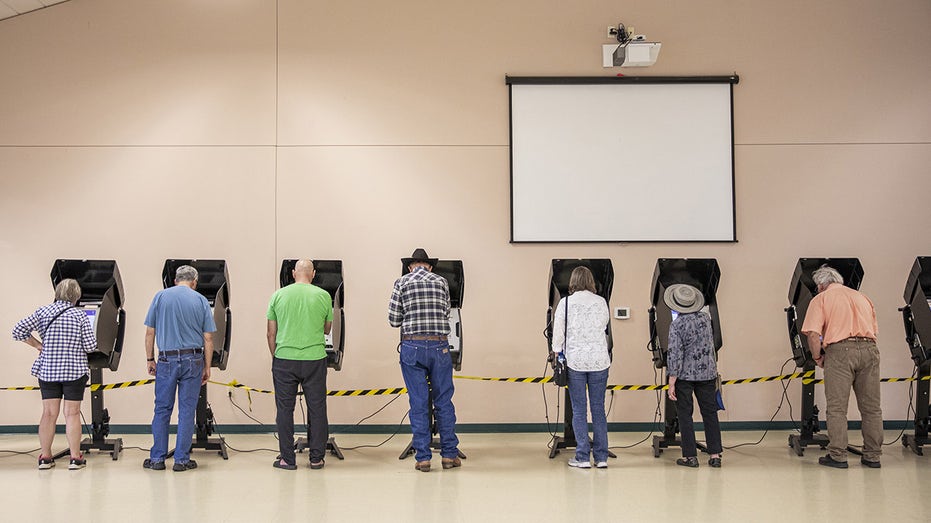A librarian running as a nonpartisan candidate for mayor of Cheyenne, Wyoming, promises to allow an artificial intelligence bot created by OpenAI to govern the state’s capital city.
Last month, Laramie County was forced to make the distinction that Victor Miller, a 42-year-old human man, would be listed on Tuesday’s primary ballot among five other candidates running for mayor of Cheyenne and “there is no Artificial Intelligence (AI) candidate running for office in Laramie County.”
During a recent library meet-and-greet, however, Miller stood behind a lectern that read “AI FOR MAYOR,” the Washington Post reported.
Miller pitched to a sparse audience that he would exclusively run the city with an AI bot called “VIC” for “Virtual Integrated Citizen” if elected, according to the Post.
He promised that the AI bot would benefit democracy given it could remain objective and free of mistakes and govern more efficiently by processing hundreds of pages of municipal minutiae. After delivering a brief PowerPoint presentation, Miller then stepped away from the podium and had the bot, operating off his Mac mini and iPad, answer questions from the audience.
One attendee, holding a wireless microphone, asked if the computer system at City Hall was sufficient to handle AI, the Post reported. Another person asked, “If elected, would you take a pay cut?”
“How would you make your decisions according to human factor, involving humans, and having to make a decision that affects so many people?” a third person asked the AI bot.
US TOPS AI RANKING INDEX WITH TRIPLE THE INVESTMENT, JOB POSTINGS AS CHINA AND OTHERS: REPORT
The Post reported that after each question, there was a pause before VIC responded in a male-sounding voice.
“Making decisions that affect many people requires a careful balance of data-driven insights and human empathy,” it said. “Here’s how I would approach it,” VIC added, outlining a six-part plan that included using AI to assemble public opinion data and answer human constituents at town halls.
In June, Wyoming Secretary of State Chuck Gray cited “significant concerns” with VIC appearing on the ballot given a qualified elector “must be a real person,” but Cheyenne City Clerk Kristina Jones, who certified Miller’s candidacy in May, insisted that the human man was “still the candidate for election per his application” even if Miller “made the decision to receive direction from an AI bot.”
If he wins the election, Miller told the Post he will attend ribbon-cutting ceremonies and shake hands, but VIC, the AI bot, would serve as the executive and decide whether to sign or veto legislation. Miller envisioned passing along information he learns during in-person events to the AI chatbot and helping facilitate VIC’s responses to constituent emails, the Post reported.
The county’s statement on July 5 said that Miller, “through countless interviews and statements to media, has consistently maintained a distinction between himself as a ‘meat avatar’ and separate from the AI-program he chooses to call VIC.”

“To allow VIC to be listed as a candidate would both violate Wyoming law and create voter confusion. VIC is not a registered voter,” the statement insisted. “Therefore, VIC cannot run for office in Wyoming and the name does not appear on Laramie County’s official ballot.”
EXPERT DISMISSES RUSSIAN COMMANDER’S ‘HIGHLY UNLIKELY’ CLAIM ABOUT CRUCIAL MILITARY ADVANTAGE OVER US
Miller initially listed the candidate’s name as VIC on the application. It would now say Victor Miller on the ballot.
But Miller said he would now go by Vic and refer to the bot as VICTOR, or “Virtual Integrated Citizen, The Official Robot.”
“They can’t stop me from doing what I’m doing. It doesn’t matter what kind of word games they play,” he said. “AI is on the ballot.”
At one point in the interview, Miller had VIC respond to questions, and the bot said it was against banning books due to their “educational value” but recommended a “balanced approach.”

Miller said he first got the idea of having an AI bot run for mayor when the city erroneously denied his public-records request for information about police officers’ job descriptions. He said AI wouldn’t have made that error. “Then I started wondering if AI would make a better mayor than any human,” he said.
“If people believe AI will run their city better than human intervention,” Rick Coppinger, one of the five other candidates running against Miller, told the Post, “then we have issues.”
AI experts who spoke to the Post warned that chatbots lack morals, could provide incorrect information to constituents and would struggle with subjective choices.
OpenAI initially shut down VIC for public operation for violating policies that ban the AI technology from being used for political campaigning.
But Miller was still able to use the bot himself. Later, OpenAI terminated Miller’s account access altogether. A day before his library presentation, however, Miller was able to create a new ChatGPT account under a different email and built a second custom VIC bot, allowing him to carry on with the meet-and-greet event as scheduled, the Post reported.
CLICK HERE FOR THE FOX NEWS APP
The incident shows AI technology is evolving more rapidly than efforts to regulate it. OpenAI, upon canceling Miller’s first account, had vowed to monitor for duplicates but failed to catch VIC 2.0.
“This incident in Wyoming seems to be testing the frontiers of local regulation,” Valerie Wirtschafter, who researches AI and democracy at the Brookings Institution, told the Post. “While OpenAI may have certain policies against using its model for campaigning, other companies do not, so it makes shutting down the campaign nearly impossible.”
“It is hard for me to talk about the ‘risks’ of having an AI mayor,” Arvind Narayanan, a computer science professor at Princeton University, told the Post. “It’s like asking about the risks of replacing a car with a big cardboard cutout of a car. Sure, it looks like a car, but the ‘risk’ is that you no longer have a car.”
Read the full article here











